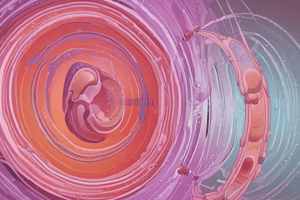Podcast
Questions and Answers
What is the recommended treatment for uncomplicated UTIs?
What is the recommended treatment for uncomplicated UTIs?
- No treatment necessary
- Kidney involvement
- Antibiotics for 3-7 days (correct)
- Antibiotics daily for several months
Which type of UTI might require longer courses of antibiotic therapy?
Which type of UTI might require longer courses of antibiotic therapy?
- UTIs in males
- UTIs with blood in urine
- UTIs with no symptoms
- UTIs involving kidney (correct)
What is the purpose of conducting a urine culture in UTI diagnosis?
What is the purpose of conducting a urine culture in UTI diagnosis?
- To identify the type and amount of bacteria present (correct)
- To check for white blood cells
- To check kidney function
- To conduct a physical exam
How can you help reduce the frequency of UTIs if you have recurring infections?
How can you help reduce the frequency of UTIs if you have recurring infections?
Which test is NOT commonly used in diagnosing UTIs?
Which test is NOT commonly used in diagnosing UTIs?
What does completing the full course of medication ensure in UTI treatment?
What does completing the full course of medication ensure in UTI treatment?
Which condition might require different antibiotic treatment than a simple cystitis?
Which condition might require different antibiotic treatment than a simple cystitis?
What tests might be ordered by a healthcare provider to diagnose a UTI?
What tests might be ordered by a healthcare provider to diagnose a UTI?
Which factor is NOT mentioned as a possible cause of UTIs?
Which factor is NOT mentioned as a possible cause of UTIs?
What is the most common symptom of a UTI?
What is the most common symptom of a UTI?
What can help minimize the risk of getting a UTI?
What can help minimize the risk of getting a UTI?
Which part of the urinary system can a UTI affect?
Which part of the urinary system can a UTI affect?
What is a sign of a kidney infection rather than a typical UTI?
What is a sign of a kidney infection rather than a typical UTI?
How do bacteria typically enter the body to cause a UTI?
How do bacteria typically enter the body to cause a UTI?
Which preventive measure is recommended to avoid UTIs?
Which preventive measure is recommended to avoid UTIs?
Flashcards are hidden until you start studying
Study Notes
Urinary Tract Infection Overview
A urinary tract infection (UTI) is an inflammation of any part of the urinary system. This can involve the kidneys, ureters, bladder, or urethra. UTIs are common, especially among women due to their shorter urethras, which makes it easier for bacteria to reach the bladder. It's crucial to understand the reasons behind UTIs, how they manifest, preventive measures, treatments available, and methods of diagnosis to keep yourself informed and protected from them.
Causes
Bacteria are typically responsible for causing UTIs. These bacteria can enter your body through the urethra and start multiplying in your bladder. Some other factors that contribute to UTIs could be weak immune systems, diabetes, kidney stones, a blockage in the urinary tract, or even catheterization.
Symptoms
The most prominent symptom of a UTI is a frequent urge to urinate with little output. Other signs include painful urination, blood in the urine, pelvic pain, fever, chills, nausea, vomiting, and discomfort in the lower abdomen. A kidney infection can cause back pain, high fevers, and vomiting.
Prevention
To minimize your risk of getting a UTI, maintain good hygiene habits by wiping front to back after using the bathroom, drinking plenty of fluids to flush out bacteria, emptying your bladder soon after intercourse, avoiding dehydration, and staying away from products that might irritate your bladder like coffee and alcohol. If you have recurring UTIs, consider taking antibiotics daily for several months to help reduce the frequency of infections.
Treatment
For uncomplicated UTIs, antibiotics are usually prescribed and the course may last between three and seven days depending upon the severity of the condition. In case of more complex conditions, such as those involving kidney involvement, longer courses of antibiotic therapy may be required. To ensure effective treatment, follow your doctor's instructions and complete the full course of medication.
Diagnosis
Your healthcare provider will conduct a physical exam, review your medical history, and order tests to diagnose a UTI. These tests might include urinalysis (checking for white blood cells), urine culture (to identify the type and amount of bacteria present), and blood test (to look for any kidney problems). Imaging studies may also be necessary if there's suspicion of acute pyelonephritis, a kidney infection that requires different antibiotic treatment than a simple cystitis.
Studying That Suits You
Use AI to generate personalized quizzes and flashcards to suit your learning preferences.




